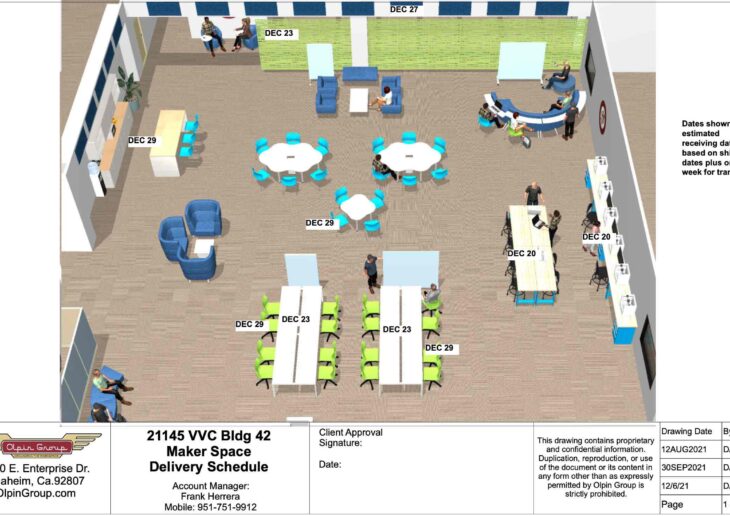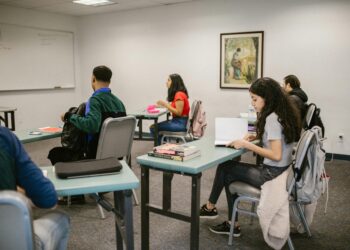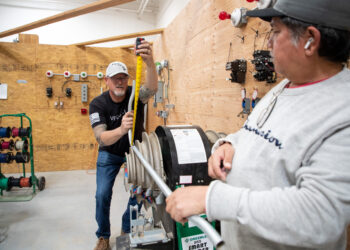
Culinary careers are sizzling again as the hospitality and restaurant industry bounces back from the pandemic and seeks to fill the positions vacated during the COVID-19 downturn. Chaffey College is doing its part to get more cooks in the kitchen.

It’s said that necessity is the mother of invention, and in the Inland Empire, innovation is always the answer to a tough challenge.
So, when the economy found itself languishing in a “COVID slump” in February 2021, with the U.S. Labor Market at 8.5 million fewer jobs than it had the year before, the region’s community colleges banded together to create an out-of-the-box solution.
For the first time in history, all 12 of the region’s community college presidents signed the “Presidents for Entrepreneurship Pledge.” The kickoff event was hosted by the National Association for Community College Entrepreneurship (NACCE) and highlighted the schools’ commitment to developing a new regional entrepreneurship curriculum.
“I think COVID is probably a prime example of why we need to think differently,” says Lisa Kiplinger Kennedy, Regional Director of Business & Entrepreneurship. “It’s showing people that starting a business … is another way of creating an income.”
According to the director, there are many industry gaps where business-minded students could help get the economy moving. As she says, “There’s a lot of potential for people to do startups and to be entrepreneurial.”
Victor Valley College Superintendent and President Dr. Daniel Walden was one of the 12 community college presidents to sign the pledge, and he says it was a “no brainer” to commit.
“I saw a statistic a couple of years ago that was basically challenging the lack of an entrepreneurial mindset in higher education in America,” explains Walden. He says that by 2030, if higher ed ignores entrepreneurship, then some 60 percent of post-secondary education will be done outside of colleges.
“It’s like Jack jumping over the candlestick,” the president quips. “Jack, be nimble, Jack, be quick. And if we’re not, we’re going to fall on the candlestick.”
That urgency, Walden says, is what made the Presidents Pledge so critical and timely. Kiplinger Kennedy concurs, explaining that while individual colleges had signed the pledge years ago and received some grant funding, this concerted regional effort represents a whole new level of commitment.
“There was never anything for an entire program,” says the director. “And it wasn’t region wide. So, this really made it so everybody around the region was doing a similar thing.”
At the pledge-signing event, the colleges committed to five action steps to advance a culture of entrepreneurship on their campuses, including networking with local industry and creating a regional framework for an entrepreneurship program. The curriculum can be adapted to any institution, whether as a single class or an entire certificate.
“We’ve created this whole ecosystem already around our region, all around entrepreneurship and innovation,” beams Kiplinger Kennedy. “Victor Valley College is one of the first that has implemented the entire program.”
VVC spearheaded an 18-credit entrepreneurship certificate out of the regional framework, including courses in “Developing an Entrepreneurial Mindset” and “Starting a Business for Entrepreneurs with Limited Resources.” Just this month, that certificate was approved by the state.
“It was really exciting for me to be in the pioneering stage for our college,” recalls Dr. Henry Young, Department Chair for Business Administration at VVC, who helped develop the courses. Now that the state has approved the certificate, he says the college can offer it through both the business department and Career Education programs. Because the entrepreneurship certificate teaches multidisciplinary skills, Young says, this development marks a huge win for the curriculum, students and local industry.
“The heart of any business ecosystem really relies on the entrepreneurs,” says the professor. “The Inland Empire region can definitely leverage a program like this.”
According to Walden, forward-thinking faculty like Young went the extra mile to develop the courses at lightning speed.
“I’ve never seen faculty move so quickly and so successfully to get a program through,” says the proud president. “It took all of us together, and I just think it’s a team effort.”
Region-wide plans are in motion to articulate the classes with California State University, San Bernardino’s school of entrepreneurship, allowing students to receive full Cal State credit for the courses.
“We’re also working to do the same things with our high school … dual or concurrent enrollment,” explains Kiplinger Kennedy. “Students could take that class and get the [community] college credit and the Cal State credit.
“We’re looking at creating this entire pathway for students throughout the region.”
VVC is also in the process of launching an “Innovation and Entrepreneurship Center,” similar to a startup incubator on campus. The big open space is a place to network, find mentoring and coaching, and gain support for entrepreneurial projects. Equipment includes rolling desks that students can write on with erasable markers in addition to comfortable couches.
The center will be supported by anchor tenants, with the Greater High Desert Chamber of Commerce and the Small Business Development Center (SBDC) considering membership, in addition to local small businesses. The opportunity will provide robust opportunities for students to network with business community members right on campus.
While the space will officially open by Fall 2022, students are already using the center. As Young says, “It is a soft opening, but there are always students in here. It’s just an engaging space.”
Having a dedicated center for entrepreneurial activities will help students take their skills into the real world, according to the professor. It’s not just another classroom, he says, but a dynamic place to practice the entrepreneurial mindset and prepare to thrive in real-world business environments.
The innovation center is part of a special partnership with Barstow Community College, which recently launched its own makerspace.
“They want to be able to complement each other’s programs,” says Kiplinger Kennedy. “They’ll have things specific to each college so students can get resources at either one.”
The two schools are also working together on a pitch competition, where students studying presentations for entrepreneurs can try out showcasing their ideas to the community.
Plans also include developing free non-credit courses for the community through the Innovation and Entrepreneurship Center.
“It will be a way for students to really engage in entrepreneurship learning in a low-stakes type of an environment,” says Young. “Our non-credit courses will take a chunk of each of those [for-credit classes] for students to chew on a little bit before they go into any for-credit classes.”
So far, student turnout for the entrepreneurship program has been strong, and Young is confident that word will spread as the first cohort graduates and the center debuts. Says Young, “Our plans are to make sure that all students, as well as those that are disproportionately marginalized in our community, have access to this.”
This effort toward equity couldn’t come at a more opportune time. In the United States, only 10 percent of startups are founded by women, according to Allied for Startups. Meanwhile, just 4.3 percent of the 22.2 million business owners in the country are Black entrepreneurs, according to Brookings, far short of proportional representation. And while the pandemic only exacerbated these kinds of disparities, VVC aims to help amend the trend.
As VVC’s president says, the entrepreneurship program is a golden opportunity for all learners to turn a challenging time into an excellent career. According to Walden, “Equity is about how we reach out to those that are socio-economically disadvantaged — or are in any way disadvantaged — and help them to have the same chance at the apple.”
Sources:
U.S. labor market inches back from the COVID-19 shock, but recovery is far from complete, Pew Research Center, https://www.pewresearch.org/fact-tank/2021/04/14/u-s-labor-market-inches-back-from-the-covid-19-shock-but-recovery-is-far-from-complete/
Choose to challenge (the lack of) diversity in entrepreneurship, Allied for Startups, https://alliedforstartups.org/2021/03/08/choose-to-challenge-the-lack-of-diversity-in-entrepreneurship/
Five-star reviews, one-star profits: The devaluation of businesses in Black communities, The Metropolitan Policy Program at Brookings, https://www.brookings.edu/wp-content/uploads/2020/02/2020.02_DevOfBizInBlackCommunities_Perry-Rothwell-Harshbarger-final.pdf

Culinary careers are sizzling again as the hospitality and restaurant industry bounces back from the pandemic and seeks to fill the positions vacated during the COVID-19 downturn. Chaffey College is doing its part to get more cooks in the kitchen.

Dual Enrollment (DE) is catching on as students and their families recognize the advantages of earning college credit while still working towards high school graduation. But students aren’t the only… Read More – Good News for Community Colleges: Dual Enrollments Are on the Rise

Enrollment in courses not offering credit toward a degree or certificate are outpacing for-credit programs in some states (Fed Communities). And it’s no wonder. With the convenience, minimal time commitment,… Read More – No Credit, No Problem: Noncredit Courses Gain Steam